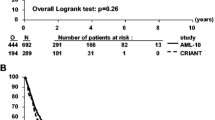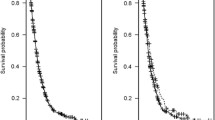Abstract
We retrospectively studied 89 consecutive patients diagnosed with primary myelodysplastic syndrome (MDS) over a period of 10 years to (1) identify prognostic factors for overall survival (OS) and leukemia-free survival (LFS); (2) to assess and compare the Bournemouth-, Spanish-, Düsseldorf-, Lille-, and the International prognostic scoring systems (IPSS); and to (3) compare the French–American–British (FAB) and World Health Organization (WHO) classifications. The median age of patients was 63 years (range, 26–85). Karyotype analyses were done in 85 patients (96%). Median OS was 3 years; 67 patients (75%) have died, and 28 (31%) had progression to acute myeloid leukemia (AML). Major independent prognostic variables for both OS and LFS (multivariate analysis) were percentage of bone marrow (BM) blasts (P<0.0001), and in patients with cytogenetic data available, cytogenetic risk groups by Lille-score (OS, P=0.031/LFS, P=0.002) and IPSS (OS, P=0.024). All five prognostic scoring systems successfully discriminated risk groups as regards OS and LFS, but in patients with cytogenetic data available, the major independent prognostic score for OS (P<0.0001) and LFS (P=0.006) was the IPSS. The FAB and WHO classifications also successfully discriminated between risk groups. The new WHO subgroups [refractory cytopenia with multilineage dysplasia (RCMD), with (RCMD-RS) or without ringed sideroblasts] showed a significantly (P=0.0454) different prognosis for OS, but not for LFS (P=0.0839), in comparison to the subgroups having erythroid dysplasia only (RA/RARS). Risk stratification into refractory anemia with excess blast-I (RAEB-I) and RAEB-II tended to yield different prognoses for OS and LFS. The 5q-minus syndrome strongly predicted for a good prognosis. In patients treated with the demethylating agent decitabine (n=24), IPSS “poor risk” cytogenetics were unable to predict for the expected worse prognosis when compared to “intermediate-risk” cytogenetics. In conclusion, we confirm in a single-center patient cohort that the use of the WHO classification improves the predictive value of the FAB classification and that, in patients with cytogenetic data available, the IPSS can be used for clinical decision-making.




Similar content being viewed by others
References
Aul C, Bowen DT, Yoshida Y (1998) Pathogenesis, etiology and epidemiology of myelodysplastic syndromes. Haematologica 83:71–86
Aul C, Gattermann N, Heyll A, Germing U, Derigs G, Schneider W (1992) Primary myelodysplastic syndromes: analysis of prognostic factors in 235 patients and proposals for an improved scoring system. Leukemia 6:52–59
Aul C, Giagounidis A, Germing U, Ganser A (2002) Evaluating the prognosis of patients with myelodysplastic syndromes. Ann Hematol 81:485–497
Aul C, Giagounidis A, Germing U, Ganser A (2002) Myelodysplastic syndromes. Diagnosis and therapeutic strategies. Med Klin 97:666–676
Bennett JM, Catovsky D, Daniel MT, Flandrin G, Galton DA, Gralnick HR, Sultan C (1982) Proposals for the classification of the myelodysplastic syndromes. Br J Haematol 51:189–199
Greenberg P, Cox C, LeBeau MM, Fenaux P, Morel P, Sanz G, Sanz M, Vallespi T, Hamblin T, Oscier D, Ohyashiki K, Toyama K, Aul C, Mufti G, Bennett J. International Scoring System for Evaluating Prognosis in Myelodysplastic Syndromes. Blood 89:2079–2088 (erratum, Blood, 91 1998:1100)
Haase D, Schanz J, Fonatsch C, Schoch C, Freund M, Haferlach T, Wörmann B (1997) Correlation of karyotype with clinical features and prognosis in 349 patients with MDS. Leuk Res 21[Suppl. 1]:(abstr. 50)
Harris NL, Jaffe ES, Diebold J, Flandrin G, Müller-Hermelink HK, Vardiman J, Lister TA, Bloomfield CD (1999) World Health Organization classification of neoplastic diseases of the hematopoietic and lymphoid tissues: report of the Clinical Advisory Committee meeting-Airlie House, Virginia, November 1997. J Clin Oncol 17:3835–3849
Heaney ML, Golde DW (1999) Myelodysplasia. N Engl J Med 340:1649–1660
Jaiyesimi IA, Friedline JA, Mattson JC, Gyorfi T (1999) Myelodysplastic syndrome at a large tertiary care community hospital: analysis according to the international prognostic scoring system. Leuk Res 24:417-426
Lee JH, Shin YR, Lee YS, Kim WK, Chi HS, Park CJ, Seo EJ, Lee KH (2003) Application of different prognostic scoring systems and comparison of the FAB and WHO classifications in Korean patients with myelodysplastic syndrome. Leukemia 17:305–313
Lübbert M, Wijermans P, Kunzmann R, Verhoef G, Bosly A, Ravoet C, Andre M, Ferrant A (2001) Cytogenetic responses in high-risk myelodysplastic syndrome following low-dose treatment with the DNA methylation inhibitor 5-aza-2'-deoxycytidine. Br J Haematol 114 2:349–357
Maes B, Meeus P, Michaux L, Bijnens L, Boogaerts M, Hagemeijer A, De Wolf-Peeters C, Verhoef G (1999) Application of the International Prognostic Scoring System for myelodysplastic syndromes. Ann Oncol 10:825–829
Mitelmann F (1995) An International System for Human Cytogenetic Nomenclature Karger, Basel, Switzerland
Mitelmann F (1991) Guidelines for cancer cytogenetics; supplement to “An international system for human cytogenetic nomenclature”; recommendations of the Standing Committee on Human Cytogenetic Nomenclature. Cancer Cytogenetics
Morel P HM, Lai JL, Duhamel A, Preudhomme C, Wattel E, Bauters F, Fenaux P (1993) Cytogenetic analysis has strong independent prognostic value in de novo myelodysplastic syndromesand can be incorporated in a new scoring system: a report on 408 cases. Leukemia 7:1315–1323
Mufti GJ, Stevens JR, Oscier DG, Hamblin TJ, Machin D (1985) Myelodysplastic syndromes: a scoring system with prognostic significance. Br J Haematol 59:425–433
Pfeilstöcker M, Reisner R, Nösslinger T, Gruner H, Nowotny H, Tuchler H, Schlogl E, Pittermann E, Heinz R (1999) Cross-validation of prognostic scores in myelodysplastic syndromes on 386 patients from a single institution confirms importance of cytogenetics. Br J Haematol 106:455–463
Pitako JA, Haas PS, van den Bosch J, Müller-Berndorff H, Kündgen A, Germing U, Wijermans PW, Lübbert M (2005) Qualification of outpatient management and hospitalization of patients with high-risk myelodysplastic syndromes treated with low-dose decitabine: A matched-pair analysis. Ann Hematol 84(Suppl 1):25–31
Sanz GF, Sanz MA, Greenberg PL (1998) Prognostic factors and scoring systems in myelodysplastic syndromes. Haematologica 83:358–368
Sanz GF, Sanz MA, Vallespi T, Canizo MC, Torrabadella M, Garcia S, Irriguible D, San Miguel JF (1989) Two regression models and a scoring system for predicting survival and planning treatment in myelodysplastic syndromes: a multivariate analysis of prognostic factors in 370 patients. Blood 74:395–408
Sole F, Espinet B, Sanz GF, Cervera J, Calasanz MJ, Luno E, Prieto F, Granada I, Hernandez JM, Cigudosa JC, Diez JL, Bureo E, Marques ML, Arranz E, Rios R, Martinez Climent JA, Vallespi T, Florensa L, Woessner S (2000) Incidence, characterization and prognostic significance of chromosomal abnormalities in 640 patients with primary myelodysplastic syndromes. Grupo Cooperativo Espanol de Citogenetica Hematologica. Br J Haematol 108:346–356
Sperr WR, Wimazal F, Kundi M, Fonatsch C, Thalhammer-Scherrer R, Schernthaner GH, Schwarzinger I, Haas OA, Geissler K, Lechner K, Valent P (2001) Survival analysis and AML development in patients with de novo myelodysplastic syndromes: comparison of six different prognostic scoring systems. Ann Hematol 80:272–277
Wijermans P, Lübbert M, Verhoef G, Klimek V, Bosly A, Ferrant A. An epigenetic approach for the treatment of advanced MDS; the experience with DNA demethylating agent 5-aza-2′-deoxycytidine (decitabine). Ann Hematol 84(Suppl 1):9–17
Wijermans P, Lübbert M, Verhoef G, Bosly A, Ravoet C, Andre M, Ferrant A (2000) Low-dose 5-aza-2′-deoxycytidine, a DNA hypomethylating agent, for the treatment of high-risk myelodysplastic syndrome: a multicenter phase II study in elderly patients. J Clin Oncol 18:956–962
Wimazal F, Sperr WR, Kundi M, Meidlinger P, Fonatsch C, Jordan JH, Thalhammer-Scherrer R, Schwarzinger I, Geissler K, Lechner K, Valent P (2001) Prognostic value of lactate dehydrogenase activity in myelodysplastic syndromes. Leuk Res 25:287–294
Yunis JJ, Rydell RE, Oken MM, Arnesen MA, Mayer MG (1986) Refined chromosome analysis as an independent prognostic indicator in de novo myelodysplastic syndromes. Blood 67:1721–1730
Zhao WL Xu L, Wu W (2002) The myelodysplastic syndromes: analysis of prognostic factors and comparison of prognostic systems in 128 Chinese patients from a single institution. Hematol J 3:137–144
Acknowledgements
We thank Dr. Ulrich Germing from the University of Düsseldorf for critical reading and constructive comments, and Dr. Pierre Wijermans, The Netherlands, The Hague, for helpful discussions. This study is supported in part by Wilhelm-Sander-Stiftung (grant 1999.032.2)
Author information
Authors and Affiliations
Corresponding author
Rights and permissions
About this article
Cite this article
Müller-Berndorff, H., Haas, P.S., Kunzmann, R. et al. Comparison of five prognostic scoring systems, the French–American–British (FAB) and World Health Organization (WHO) classifications in patients with myelodysplastic syndromes: results of a single-center analysis. Ann Hematol 85, 502–513 (2006). https://doi.org/10.1007/s00277-005-0030-z
Received:
Accepted:
Published:
Issue Date:
DOI: https://doi.org/10.1007/s00277-005-0030-z




